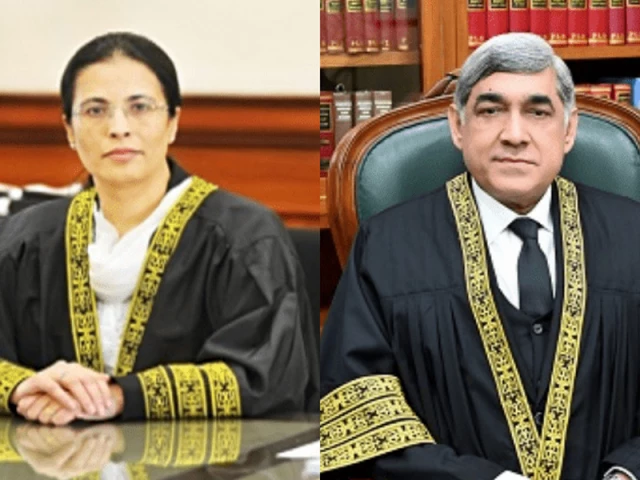Bench formation: judges urge transparency
Say lack of transparency may shake public confidence

Justice Ayesha Malik and Justice Aqeel Ahmed Abbasi have issued a dissenting note, dismissing the review petitions filed by the PML-N, the PPP and the Election Commission of Pakistan (ECP) against the Supreme Court's July 12, 2024 order to allocate reserved seats to the PTI.
On January 13, 2024, a three-member Supreme Court bench upheld the ECP's December 22, 2023 order declaring the PTI's intra-party polls null and void. Later, the PTI candidates had to contest the February 8, 2024 general elections as independents.
Eighty such independent candidates reached the National Assembly and later joined the SIC in an apparent bid to claim reserved seats for women and minorities. The ECP, however, refused to allocate those seats to the party, a decision the SIC challenged in the Supreme Court.
On July 12, 2024, a full bench of the apex court through a majority of 8 to 5 resurrected the PTI as a parliamentary party. The PPP, the PML-N and the ECP filed review petitions against the order and an 11-member constitutional bench by a majority of 7 to 4 accepted the petitions on June 28, 2025.
According to the dissenting note of Justice Ayesha and Justice Abbasi, all three review petitions were filed against the SC's short order of July 12, 2024, while only the ECP later filed additional petitions based on the detailed judgment issued on September 23, 2024.
The judges observed that all legal questions and arguments had already been addressed in the detailed judgment; however, the counsels attempted to reopen the casesomething not permissible within the scope of the law, as a review is not an appeal and its jurisdiction remains strictly limited.
The note emphasized that only those judgments can be reviewed which contain an apparent legal error; minor irregularities or differences of opinion do not constitute grounds for review. It further stated that Supreme Court decisions are final and rendered after full deliberation, therefore, the process of review cannot be treated as a routine proceeding.
The judges noted that most review petitions are filed merely out of dissatisfaction, and the current petitions fall into that same category, as no solid legal justification was presented.
They pointed out that neither the PML-N nor the PPP raised any specific objections to the detailed judgmentinstead, they only challenged the short order, even though the petitions were filed on July 13, when the detailed judgment had not yet been released. Despite the passage of considerable time, the petitioners failed to present any new stance or legal basis, the judges added.
Both judges also expressed serious reservations over the constitution of the subsequent bench, calling it contrary to judicial norms. They noted that when the original case was heard, it was before a 13-member bench, whereas the CB that heard the review petition did not include five of those judges, including the author of the original judgment.
The note stated that the bench was reconstituted under Article 191A of the Constitution, which was introduced through the 26th Constitutional Amendment.
After this amendment, the Judicial Commission of Pakistan (JCP) nominates judges for constitutional benches, with members of the Senate and National Assembly also includeda change that, according to the dissenting judges, has led to a political majority within the commission.
The dissenting note cautioned that this political dominance raises questions over the judiciary's neutrality and transparency, as the CB appeared to have been formed on the basis of a political majority of the PML-N and the PPP in the JCP, which runs counter to the principle of judicial independence.
The judges further underscored that under the Constitution, it is the duty of the JCP and its committee to ensure the formation of impartial benches, and that judicial benches must be constituted in accordance with constitutional requirements and principles of transparency.
The dissent warned that if the transparency of bench formation is called into question, the entire judicial process becomes suspect, posing a serious threat to public confidence and to the balance of the justice system itself.





















COMMENTS
Comments are moderated and generally will be posted if they are on-topic and not abusive.
For more information, please see our Comments FAQ